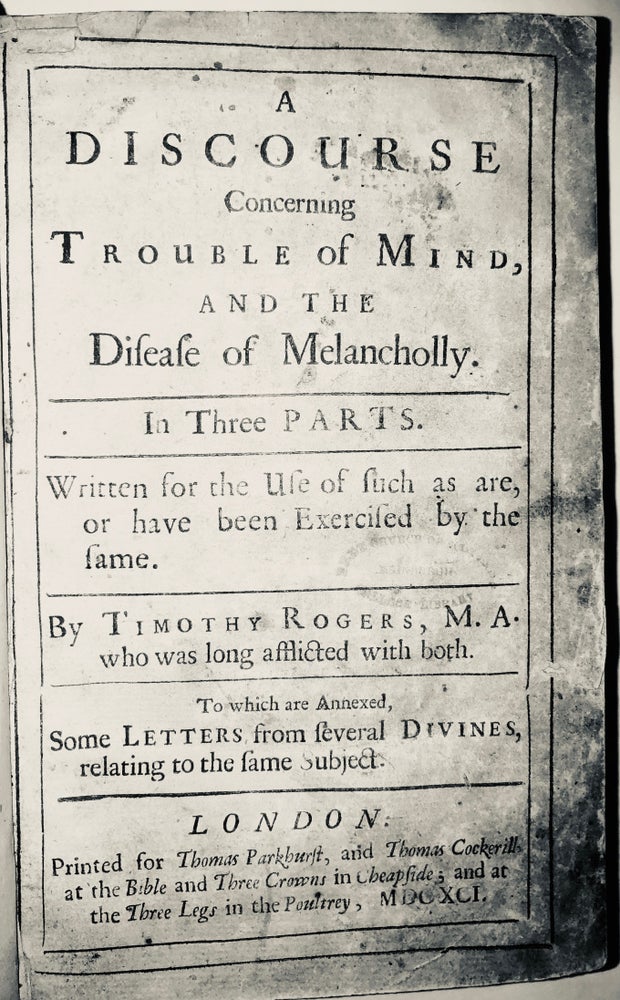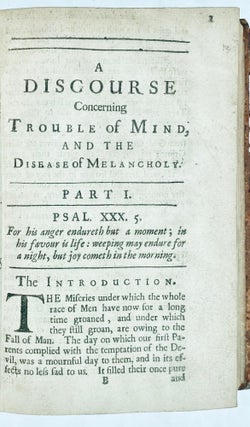A discourse concerning trouble of mind, and the disease of melancholly. In three parts. Written for the use of such as are, or have been exercised by the same. By Timothy Rogers, M.A. who was long afflicted with both. To which are annexed, some letters from several divines, relating to the same subject
London:printed for Thomas Parkhurst, and Thomas Cockerill at the Bible and Three Crowns in Cheapside, and at the Three Legs in the Poultrey1691, 1658-1728. Early calf, recased with later leather spine, leather spine label. Edges moderately worn, small library stamp on front endpaper, title page soiled, edges of text block closely cropped, occasional light spotting. “Rogers was educated at Glasgow University, where he matriculated in 1673, and then studied under Edward Veal at Wapping.Rogers began his career in the dissenting ministry as evening lecturer at Crosby Square, Bishopsgate. Some time after 1682 he was struck down by a form of hypochondria, from which he recovered in 1690, and then became assistant to John Shower. Shower was then minister of the Presbyterian congregation in Jewin Street, and moved in 1701 to the Old Jewry Meeting-house. Rogers's hypochondria returned, and in 1707 he left the ministry .(DNB)
Rogers cautions not to blame the devil for this depression:
"Do not attribute the effects of mere Disease, to the Devil", He describes how the mind can make the body sick: "If a Man, saith he, that is troubled in Conscience, come to a Minister, it may be, he will look all to the Soul, and nothing to the Body; if he come to a Physician, he considereth the Body, and neglecteth the Soul: for my part, I would never have the Physician's Counsel despised, nor the Labour of the Minister neglected; because the Soul and Body dwelling together, it is convenient, that as the Soul should be cured, by the Word, by Prayer, by Fasting, or by Comforting; so the Body must be brought into some temperature, by Physick, and Diet, by harmless Diversions, and such like ways."
"Rogers's detailed instructions on how to care for patients suffering from `trouble of mind', especially from `melancholly' of the religious kind, are particularly valuable because they were written from personal experience; as the extract shows much of his advice can still be usefully applied by the psychiatrist and the psychiatric nurse today. It appears from his biography prefixed to the third edition of his book (London 1808; a second edition appeared in 1706) that he came from a family in which several near relatives were similarly affected 'so that his case might properly be called natural or hereditary'. In his late twenties he had his first breakdown, 'a deep and settled melancholy' lasting two years. On his recovery he wrote this book as an offering 'for his wonderful restoration', to discharge 'the Duty of those Persons whom God hath delivered from Melancholy, and from the anguish of their Consciences' and to show `What is to be thought of those that are distracted with Trouble for their sins'. However he continued ever after subject to 'a very unhappy dejection of mind . . . a prey to gloomy fears and apprehensions', so that he was forced to retire into the country where he continued to manifest 'though in a more contracted sphere, the same zeal for the honour of God, and for the salvation of the souls of men'." (300 years of Psychiatry, Richard Hunter, 1963, p248)
Archibald Alexander (17721851), the first professor at Princeton Theological Seminary, was a perceptive student of human behavior. His insights on counseling, especially on dealing with depression, are remarkably valid for today. In his Thoughts on Religious Experience (1844), Alexander wrote concerning the causes of depression:
“ When religious melancholy becomes a fixed disease, it may be reckoned among the heaviest calamities to which our suffering nature is subject. It resists all argument and rejects every topic of consolation, from whatever source it may proceed. It feeds upon distress and despair and is displeased even with the suggestion or offer of relief. The mind thus affected seizes on those ideas and truths which are most awful and terrifying. Any doctrine which excludes all hope is congenial to the melancholy spirit; it seizes on such things with an unnatural avidity and will not let them go. [Alexander 1978, 35] Alexander tells of Timothy Rogers, a London minister who lived from 1658 to 1728. Rogers was a godly, pious, and able pastor. Yet he was overtaken by a severe depression which today would probably be diagnosed as involutional depression. Rogers’s depression was so acute that he “gave up all hope of the mercy of God, and believed himself to be a vessel of wrath, designed for destruction, for the praise of the glorious justice of the Almighty”(Alexander 1978, 35).
Alexander describes Rogers’s condition in terms that tell us the man was clinically depressed, perhaps even psychotically depressed at times. It is clear that Alexander accepts Rogers’s depressed feelings as genuine and recognizes them as the cause of the spiritual problem which clouded his perceptions. Yet Alexander does not conclude that Rogers was damned, nor does he charge him with spiritual backsliding or lack of faith. Rather he sees a severe depression that needed to be understood. Rogers’s depression eventually ran its course, as do most involutional depressions. Many Christians cared for him and prayed on his behalf. After his depression lifted, Rogers became interested in ministering to others who experienced depression. As part of this effort he wrote treatises entitled Recovery from Sickness and Consolation for the Afflicted . Alexander was so impressed with the preface in Rogers’s Discourse on Trouble of Mind and the Disease of Melancholy that he put its contents verbatim into his own Thoughts on Relgious Experience . Those thoughts of Rogers on depression are of such high caliber that I have reproduced them in the appendix. They are the best material I have found on counseling depressed Christians. (© 1984 by William T. Kirwan)
Wing; R1848; Hunter p248. Item #236J
Octavo A8 (a)-(d)8 (e)4, B-2E8 ( leaf S7 pages 269/270 torn in the out margin affecting one word in each line) first Edition , bound in original calf boards neatly rebacked.
Price: $4,000.00



